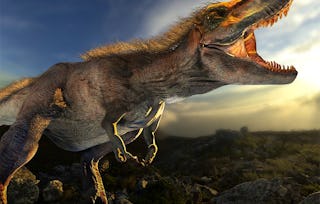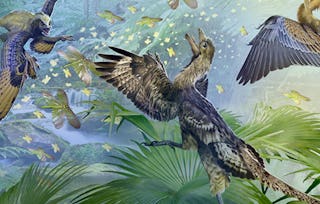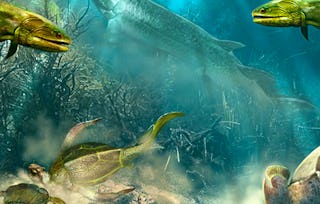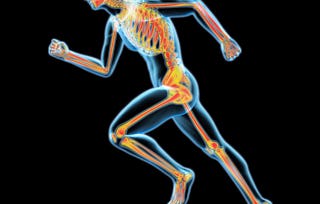Dino 101: Dinosaur Paleobiology is a 12-lesson course teaching a comprehensive overview of non-avian dinosaurs. Topics covered: anatomy, eating, locomotion, growth, environmental and behavioral adaptations, origins and extinction. Lessons are delivered from museums, fossil-preparation labs and dig sites. Estimated workload: 3-5 hrs/week.

Dino 101: Dinosaur Paleobiology

3,805 reviews
Skills you'll gain
Details to know
12 assignments
See how employees at top companies are mastering in-demand skills

There are 12 modules in this course
This lesson covers the diversity in dinosaur appearances, and will be able to identify major features of the major groups of dinosaurs.
What's included
7 videos4 readings1 assignment
This module describes how fossils form, how we interpret the taphonomy of skeletons and bonebeds, and looks at the possible biases taphonomic events may create in the fossil record.
What's included
3 videos1 reading1 assignment
This module looks at the variety of food types, feeding habits, and feeding adaptations amongst the major groups of dinosaurs.
What's included
4 videos1 reading1 assignment
This module helps students understand the general modes and styles of locomotion in the major dinosaur groups. It also describes general methods of evaluating hypotheses on locomotion.
What's included
4 videos1 reading1 assignment
This module provides a generalized life history of a dinosaur, from birth through adulthood, including reproduction. The student will be able to describe major techniques of evaluating growth stages and rates in dinosaurs.
What's included
3 videos1 reading1 assignment
Examines the behaviours and structures that may have served for attack or defence through the lifetime of a dinosaur.
What's included
3 videos1 reading1 assignment
This module will teach the different ways of defining what a species is. Students will be able to compare the strengths and weaknesses of different species concepts for different situations.
What's included
3 videos1 reading1 assignment
This module will describe the basic theories of speciation, and discusses how how these different methods of speciation may have occurred, including both hypothetical and empirical examples.
What's included
3 videos1 reading1 assignment
This method provides basic stratigraphic concepts and the scale of earth history. Students will understand the evolution of dinosaurs through time, including which groups evolved when and where.
What's included
3 videos1 reading1 assignment
This module presents the basic concepts in plate tectonics and the evolution of the earth’s surface.
What's included
4 videos1 reading1 assignment
This module will look at the evolution of dinosaurs from non-dinosaurian archosaurs.
What's included
3 videos1 reading1 assignment
The module will examine the end-Cretaceous extinction event, and provide examples of vertebrate groups that both persisted and died out during the event.
What's included
4 videos1 reading1 assignment
Instructor

Offered by
Explore more from Basic Science
 Status: Preview
Status: PreviewAmerican Museum of Natural History
 Status: Preview
Status: PreviewUniversity of Alberta
 Status: Preview
Status: PreviewUniversity of Alberta
 Status: Free Trial
Status: Free TrialDartmouth College
Why people choose Coursera for their career

Felipe M.

Jennifer J.

Larry W.

Chaitanya A.
Learner reviews
- 5 stars
92.14%
- 4 stars
7.03%
- 3 stars
0.68%
- 2 stars
0.05%
- 1 star
0.07%
Showing 3 of 3805
Reviewed on Aug 13, 2020
I just finished the class with my 8 years old son. We had so much fun! I hope every class is like that!only have problem opening bone carbinet on MacBook. Everything else is just perfect!
Reviewed on Nov 15, 2020
This was such an awesome course! Philip and Betsey were great to listen to, they make the course fun and every lesson is fascinating to learn. My love for dinosaurs have grown so much more.
Reviewed on Nov 24, 2020
Well done, nicely organized, easy to go at your own pace. Perhaps hits vocabulary too much. I'd rather have a stronger paleoecology componet. Still, very enjoyable and full of stories.

Open new doors with Coursera Plus
Unlimited access to 10,000+ world-class courses, hands-on projects, and job-ready certificate programs - all included in your subscription
Advance your career with an online degree
Earn a degree from world-class universities - 100% online
Join over 3,400 global companies that choose Coursera for Business
Upskill your employees to excel in the digital economy
Frequently asked questions
To access the course materials, assignments and to earn a Certificate, you will need to purchase the Certificate experience when you enroll in a course. You can try a Free Trial instead, or apply for Financial Aid. The course may offer 'Full Course, No Certificate' instead. This option lets you see all course materials, submit required assessments, and get a final grade. This also means that you will not be able to purchase a Certificate experience.
More questions
Financial aid available,

